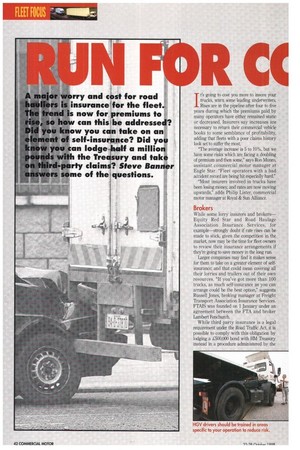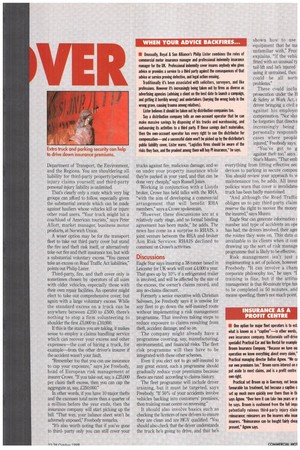major worry and cost for road buliers is insurance for the fleet.
Page 44

Page 45

If you've noticed an error in this article please click here to report it so we can fix it.
The trend is now for premiums to .1 rise, so how can this be addressed?
PDid you know you can take on an element of self-insurance? Did you know you can lodge half a million pounds with the Treasury and take on third-party claims? Steve Banner answers some of the questions. I
/ es. going to cost you more to insure your trucks, warn some leading underwriters, Rises are in the pipeline after four to five years during which the premiums paid by many operators have either remained static or decreased. Insurers say increases are necessary to return their commercial vehicle books to some semblance of profitability, adding that fleets with a poor claims history look set to suffer the most.
"The average increase is 5 to 10%, but we have some risks which are facing a doubling of premium and then some," says Ron Munro, assistant commercial motor manager at Eagle Star. "Fleet operators with a bad accident record are being hit especially hard."
"Most insurers involved in trucks have been losing money, and rates are now moving upwards," adds Philip Lister, commercial motor manager at Royal & Sun Alliance.
Brokers
While some lorry insurers and brokers— Equity Red Star and Road Haulage Association Insurance Services, for example—strongly doubt if rate rises can be made to stick, given the competition in the market, now may be the time for fleet owners to review their insurance arrangements if they're going to save money in the long run.
Larger companies may find it makes sense for them to take on a greater element of selfinsurance; and that could mean covering all their lorries and trailers out of their own resources. "If you've got more than 100 trucks, as much self-insurance as you can arrange could be the best option," suggests Russell Jones, hroking manager at Freight Transport Association Insurance Services. FTAIS was founded on 1 January under an agreement between the FTA and broker Lambert Fenchurch.
While third party insurance is a legal requirement under the Road Traffic Act, it is possible to comply with this obligation by lodging a £500,000 bond with HM Treasury instead in a procedure administered by the Department of Transport, the Environment, and the Regions. You are shouldering all liability for third-party property/personal injury claims yourself; and third-party personal injury liability is unlimited.
That's clearly only a route which very big groups can afford to follow, especially given the substantial awards which can be made against hauliers whose vehicles kill or injure other road users. "Your truck might hit a coachload of American tourists," says Peter Alloft, market manager, business motor products, at Norwich Union.
A wiser option may be for the transport fleet to take out third party cover but stand the fire and theft risk itself, or alternatively take out fire and theft insurance too, but with a substantial voluntary excess. "You cannot take an excess on Road Traffic Act liabilities," points out Philip Lister.
Third-party, fire, and theft cover only is sometimes chosen by operators of all sizes with older vehicles, especially those with their own repair facilities. An operator might elect to take out comprehensive cover, but again with a large voluntary excess. While the standard excess on a truck can be anywhere between £250 to .£500, there's nothing to stop a firm volunteering to shoulder the first £5,000 to £10,000.
If this is the stance you are taking, it makes sense to employ a claims handling service which can recover your excess and other expenses—the cost of hiring a truck, for example—from the other driver's insurer if the accident wasn't your fault.
"Remember too that you can use insurance to cap your exposure," says Joe Freebody, head of European risk management at insurer Crowe. "If you take out, say, a £25,000 per claim theft excess, then you can cap the aggregate at, say, £250,000."
In other words, if you have 10 major thefts and the excesses total more than a quarter of a million before the year ends, then the insurance company will start picking up the bill. "That way, your balance sheet won't be adversely exposed," Freebody remarks.
"It's also worth noting that if you've gone to thirdparty only you can still cover your trucks against fire, malicious damage, and so on under your property insurance while they're parked in your yard, and that can be done very cheaply," says Russell Jones.
Working in conjunction with a Lloyds broker, Crowe has held talks with the RHA, "with the aim of developing a commercial arrangement that will benefit RHA members," says a Crowe spokesman.
"However, these discussions are at a relatively early stage, and no formal binding agreement has been made," he adds. The news has come as a surprise to RHAIS, a joint venture between the RHA and broker Aon Risk Services: RH-AIS declined to comment on Crowe's activities.
Discussions
Eagle Star says insuring a 38-tormer based in Leicester for UK work will cost £4,000 a year. That goes up by 10% if a refrigerated trailer is involved, and will be affected by the size of the excess, the owner's claims record, and any no-claims discount.
Formerly a senior executive with Christian Salvesen, Joe Freebody says it is unwise for any fleet to go down the self-insured route without implementing a risk management programme. That involves taking steps to reduce exposure to claims resulting from theft, accident damage, and so on.
The company might already have a programme covering, say, manufacturing, environmental, and financial risks. The fleet risk programme will then have to be integrated with these other schemes.
Even if you elect not to go self-insured to any great extent, such a programme should gradually reduce your premiums because fleets are rated according to claims history The fleet programme will include driver training, but it must be targeted, says Freebody. "If 50% of your accidents involve vehicles backing into customers' premises, then training must centre on reversing."
It should also involve basics such as checking the licences of new drivers to ensure they are clean and are HGV qualified. "You should also check that the driver understands the truck he's going to drive, and that he's shown how to use equipment that he no unfamiliar with," Free explains. "If the vehic fitted with an unusual t) tail-lift and he's injured using it untrained, then could be all sort: problems."
These could inclu prosecution under the fi & Safety at Work Act, c driver bringing a civil against his employer compensation. "Nor sho be forgotten that director increasingly being personally responsib cases where people injured," Freebody says.
"You've got to g against theft too," says I Star's Munm. "That emb everything from fitting effective sec devices to parking in secure compou You should review your approach to vi maintenance too, he adds. All insur policies warn that cover is invalidatel truck has been badly maintained.
"And although the Road Traffic obliges us to pay third-party claim reserve the right to recover the money the insured," says Munro.
Eagle Star can generate information c number and type of accidents an one has had, the drivers involved, their age the routes they were on. This data c.; invaluable to its clients when it corn drawing up the sort of risk manage programme that is likely to be effective.
Risk management isn't just a implementing a set of policies, however Freebody. "It can involve a char corporate philosophy too," he says. "I training is fine, but if the attitt.a management is that 60-minute trips has to be completed in 50 minutes, and means speeding, there's not much point
INSURANCE AS A PROFIT CENTRE t One option for major fleet operators is to est, what is known as a "captive"—n other words, own insurance company. Nationwide self-drive specialist Practical Car and Van Rental for example Broom Insurance Company. "Because we have ow operation we know everything about every claim," Practical managing director Bolter Agnew. "We ca our own premiums too." Broom earns interest on n put aside to meet claims, and is a profit centre own right
Practical set Broom up in Ciinsey, not becau favourable tax treatment, but because a captive c set up much more quickly over there than in th says Agnew. "Over here it can take two years or rr he says. Broom is cushioned from the full impa potentially ruinous third-parry injury clairr reinsurance: reinsurers are the insurers who insin insurers. "Reinsurance can be bought fairly cheal present," Agnew says.
WHEN YOUR ADVICE BACKFIRES...
• Unusually, Royal & Sun Alliance's Philip Lister combines the roles of commercial motor insurance manager and professional indemnity insurance manager for the UK. Professional indemnity cover insures anybody who gives advice or provides a service to a third party against the consequences of that advice or service proving defective, and legal action ensuing.
Traditionally it's been associated with solicitors, surveyors, and like professions. However it's increasingly being taken out by firms as diverse as advertising agencies (advising a client on the best date to launch a campaign, and getting it horribly wrong) and undertakers (burying the wrong body in the wrong grave, causing trauma among relatives).
Lister believes it should be taken out by distribution companies too.
Say a distribution company tells an own-account operator that he can make massive savings by disposing of his trucks and warehousing, and outsourcing its activities to a third party. If those savings don't materialise, then the own-account operator has every right to sue the distributor for compensation—and a successful claim won't be picked up by the distributor's public liability cover, Lister warns. "Logistics firms should he aware of the risks they face, and the prudent among them will buy PI insurance," he says.
















































































































